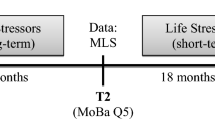Abstract
The associations between employment status, role choice, social support, stressful events, and mothers' experiences of stress and role satisfaction were investigated. Interviews and questionnaires were used to obtain information from 105 mothers with two-year-old children. Role choice, social support, and stressful events each predicted the amount of stress mothers experienced in their lives, although not all did so independently. Employment status, role choice, and social support predicted role satisfaction.
Similar content being viewed by others
References
Baruch, G., Biener, L., & Barnett, R. (1987). Women and gender in research on work and family stress.American Psychologist, 42 130–136.
Burr, W., Leigh, G., Day, R., & Constantine, J. (1979). Symbolic interaction and the family. In W. Burr, R. Hill, F.I. Nye, & I. Reiss (Eds.),Contemporary theories about the family, Vol. 2 (pp. 42–111). New York: Free Press.
Cobb, S. (1976). Social support as a moderator of life stress.Psychosomatic Medicine, 38 300–314.
Cohen, S., Kamark, T., & Mermelstein, R. (1983). A global measure of perceived stress.Journal of Health and Social Behavior, 24 385–396.
Crnic, K., Greenberg, M., & Slough, N. (1986). Early stress and social support influences on mothers' and high-risk infants' functioning in late infancy.Infant Mental Health Journal, 7 19–33.
Crockenberg, S. (in press). Social support and parenting. In H. Fitzgerald, B. Lester, & M. Yogman (Eds.),Theory and research in behavioral pediatrics. New York: Plenum Press.
Darian, J. (1976). Factors influencing the rising labor force participation rates of married women with preschool children.Social Science Quarterly, 56 614–630.
Dean, A., & Lin, N. (1977). The stress-buffering role of social support.Journal of Nervous and Mental Disease, 165 403–417.
Dunst, C., & Trivette, C. (1986). Looking beyond the parent-child dyad for the determinants of maternal styles of interaction.Infant Mental Health Journal, 7(1), 69–81.
Eisenberg, P., & Lazarsfeld, P. (1938). The psychological effects of unemployment.Psychological Bulletin, 35 358–390.
Ferree, M. (1976). Working class jobs: Housework and paid work as sources of satisfaction.Social Problems, 23 431–441.
Gove, W., & Geerken, M. (1977). The effect of children and employment on the mental health of married men and women.Social Focus, 56 66–76.
Guttman, L. (1945). A basis for analyzing test-retest reliability.Psychometrica, 10 255–282.
Harrell, J., & Ridley, C. (1975). Substitute child care, maternal employment and the quality of mother-child interaction.Journal of Marriage and the Family, 37 556–564.
Hayghe, H. (1986). Rise in mothers' labor force activity includes those with infants.Monthly Labor Review, 109 (2), 43–45.
Hoffman, L. (1961). Effects of maternal employment on the child.Child Development, 32 187–197.
Kandel, D., Davies, M., & Raveis, V. (1985). The stressfulness of daily social roles for women: Marital, occupational and household roles.Journal of Health and Social Behavior, 26 64–78.
Kessler, R., & McRae, J., Jr. (1982). The effects of wives' employment on the mental health of men and women.American Sociological Review, 47 216–227.
Klein, R. (1985). Caregiving arrangements by employed women with children under 1 year of age.Developmental Psychology, 21 403–406.
Lerner, J., & Galambos, N. (1985). Maternal role satisfaction, mother-child interaction, and child temperament: A process model.Developmental Psychology, 21 1157–1164.
Levitt, M., Weber, R., & Clark, M. (1986). Social network relationships as sources of maternal support and well-being.Developmental Psychology, 22 310–316.
Long, J., & Porter, K. (1984). Multiple roles of midlife women: A case for new directions in theory, research, and policy. In G. Baruch & J. Brooks-Gunn (Eds.),Women in midlife (pp. 109–160). New York: Plenum Press.
Mercer, R., Hackley, K., & Bostrom, A. (1984). Social support of teenage mothers.Birth defects: Original article series, 20 245–290.
Merikangas, K. (1985, May).Sex differences in depression. Paper presented at the Murray Center (Radcliffe College) Conference: Mental Health in Social Context, Cambridge, MA.
Moen, P. (1985).Work and parental well-being: Social change in Sweden. Unpublished manuscript, Cornell University, Ithaca, NY.
Nye, F. I. (1959). Employment status of mothers and adjustment of adolescent children.Marriage and Family Living, 21, 240–244.
Nye, F. I. (1963). The adjustment of adolescent children. In F.I. Nye & L. Hoffman (Eds.),The employed mother in America (pp. 133–141). Chicago: Rand-McNally.
Pearlin, L., Lieberman, M., Menaghan, E., & Mullan, J. (1981). The stress process.Journal of Health and Social Behavior, 22 337–356.
Seligman, M. (1975).Helplessness. San Francisco: Freeman.
Tebbets, R. (1982). Work: Its meaning for women's lives. In D. Belle (Ed.),Lives in stress: Women and depression (pp. 83–95). Beverly Hills, CA: Sage.
Thomson, E. (1980). The value of employment to mothers of young children.Journal of Marriage and the Family, 42 551–566.
Thomas, L., McCabe, E., & Berry, J. (1980). Unemployment and family stress: A reassessment.Family Relations, 29 517–524.
Verbrugge, L. (1982). Women's social roles and health. In P. Berman & E. Ramey (Eds.),Women: A developmental perspective (Publication No. 82-2298, pp. 49–780). Bethesda, MD: National Institutes of Health.
Weinraub, M., & Wolf, B. (1983). Effects of stress and social supports on mother-child interactions in single and two-parent families.Child Development, 54 1297–1311.
Woods, M. (1972). The unsupervised child of the working mother.Developmental Psychology, 6 14–25.
Yarrow, M., Scott, P., deLeeuw, L., & Heinig, C. (1962). Childrearing in families of working and nonworking mothers.Sociometry, 25 122–140.
Author information
Authors and Affiliations
Additional information
Thanks are extended to Lynn Arner, Susan Goodwyn, and Cindy Litman for their contributions to the project, and to Curt Acredolo and Leanne Friedman for their assistance with statistical analysis and computer programming.
Susan B. Crockenberg received her Ph.D. from Stanford University. She is now a Professor, Department of Applied Behavioral Sciences, University of California, Davis, CA 95616. Research interests include the developmental, contextual, and child determinants of maternal role adjustment, maternal behavior, and their impact on the child's social-emotional development.
Rights and permissions
About this article
Cite this article
Crockenberg, S.B. Stress and role satisfaction experienced by employed and nonemployed mothers with young children. J Fam Econ Iss 9, 97–110 (1988). https://doi.org/10.1007/BF00986933
Issue Date:
DOI: https://doi.org/10.1007/BF00986933




